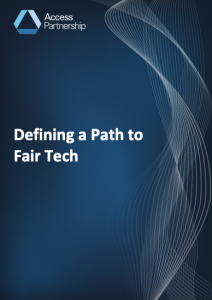Fairness is not usual, it is not spread around equally despite a kinship to the notion of equity, it is no more lasting than physical beauty, and it cannot be defined out of context: you know it only when you see it, and by then it is often gone. Dynamic systems such as schoolyards, the Internet economy or human immunology are not conducive environments, and this means the technology sector has to work a little bit harder to do what is fair.
The reach for fairness by the tech sector is less a matter of dispute than of route. Every company wants a fair (level) playing field, fair terms of trade, and for consumers to have a fair shot at using their offering to their best advantage. Equally, those policymakers with sufficient collective bargaining power seek to apply fairness measures to the purveyors of technology by regulating how they compete, how they announce their intentions, and how they keep their promises.
This report is not an exercise in political philosophy, but it may feel like a manifesto of sorts. It attempts to provide the contours of a framework for how the international community can enjoy the benefits of technology on terms that are fair and – an important consequence of fairness – terms that are lasting. This is in part achieved by explaining how the tech sector is perceived from all those who interact with it: an entire generation of policymakers has grown up fretting about the digital divide and its effect on the global economy without fully recognising that responsibility for bridging it lay as much with governments as with their citizens and those companies in whom they are in direct and cringingly intimate relationships. When I know as much about you as you know about yourself, we have equal knowledge of you. If only I have the power to turn that knowledge to major advantage we have something else, but it is not fairness, and the consumer will not appreciate it.
  | Fair Tech and Why We Want It Trans-Atlanticism: The First Step in Fair Tech Access to Infrastructure in a Fair Tech World Is Digital Tax the Way for Fair Tech? Fair Tech and Democracy: Thoughts on Content, Misinformation and Elections Is Fair Tech Chinese, European or American? Fair Tech in the Global South: Realities and Perceptions |




